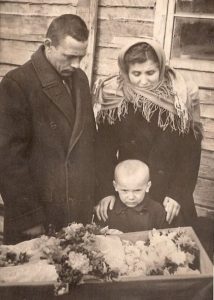The Silent Breath of Grief: A Father’s Hand on a Small Coffin

The chapel air was thick and heavy, smelling faintly of lilies and untouched sorrow. The light, usually so indifferent, seemed muted, filtering through stained glass that cast colored shadows over the polished wood of the small, white coffin. No parent should ever stand beside the coffin of their child—yet there they were: Michael and Clara Davies, standing at the precipice of a grief too profound for language.
Their little girl, six-year-old Lily, was gone. A sudden, inexplicable illness had stolen her laughter, her bright red boots, and the way she used to mispronounce ‘spaghetti.’

The Empty Space
Clara’s hand rested on the coffin’s lid, a gesture of lingering possession. Her pain didn’t scream; it breathed, shallow and silent, a constant pressure behind her ribs. The empty space in her arms was a physical ache, a phantom weight where Lily’s head used to rest.
Michael, the architect of their family’s strength, found himself suddenly stripped of his blueprints. His eyes, usually steady, were lost. He looked down at their son, eight-year-old Thomas, who stood rigid between them. Thomas, still small, had a grief too heavy for his young heart to bear alone.

Michael’s left hand settled on Thomas’s slender shoulder, a weight of reassurance, guiding him through a landscape of adult despair. This was Michael’s mission now: not to fix the unfixable, but to shepherd the living through the shockwave of loss. “We have to be strong for Lily, Buddy,” he whispered, a lie he repeated until it felt like a prayer.

Flowers and Fragile Memories
The coffin was filled with flowers—white roses, baby’s breath, and the colorful, slightly wilted daisies Thomas had picked from the garden that morning. But nothing, not the beauty of the blossoms nor the comforting murmurs of friends, could fill the yawning void.
The moment came for the final viewing. Thomas, hesitant but determined, gripped his father’s hand. He leaned over the edge, his small, tear-streaked face reflecting the quiet face of his sister. He didn’t cry then. Instead, he reached into his pocket and pulled out a small, shiny stone—a “lucky rock” they had found together at the beach last summer. He carefully placed it near Lily’s hand.
It was an act of a child’s pure, uncomplicated love—a gesture that said, You need this more than I do.

In that moment, Michael understood the cruel duality of their situation. Love is sometimes holding on, and sometimes letting go. They had held Lily fiercely in life. Now, the ultimate act of love was allowing her to depart, while holding onto the fragments of happiness she had left behind.
As the chapel doors opened to the crisp, indifferent air outside, Michael put his arms around both his wife and his son, binding them together. They didn’t walk out as a family made whole, but as one irrevocably broken, yet bound by a new, fiercer kind of love. They walked out, not toward an ending, but toward the terrifying, unknown beginning of a life redefined by loss, carrying the silent breath of grief, and the undeniable, unconquered power of their enduring love for the little girl they would never forget.